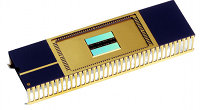Samsung ships phase-change memory
Sep 29, 2009 — by LinuxDevices Staff — from the LinuxDevices Archive — viewsSamsung announced that it has begin producing 512Mb (64MB) PRAM (phase change random access memory) chips. The new, non-volatile memory technology is up to ten times faster than flash and will extend handset battery life by more than 20 percent, the company claims.
Unlike DRAM or flash memory, PRAM uses heat to store data, not electrons. The technology uses chalcogenide glass, which contains elements such as sulphur, selenium, or tellurium. This material, which has also been used on rewritable optical media, can exist in both crystalline and amorphous states. Heat is used to toggle between them, thereby storing a single bit of information.
PRAM's advocates — which have included Intel and STMicroelectronics as well as Samsung — note that flash memory stores data by modulating electrons stored within the gate of a transistor, requiring relatively large voltages and amounts of time. It's said that PRAM can offer substantially lower power consumption, and speed approaching that of DRAM.
Another cited advantage of PCM is bit alterability, meaning that a single bit can be changed at any time. With flash, changing one bit can require erasing a "block" of data that may contain hundreds or even thousands of bits. This slows down writes and increases wear.
 Samsung has been working on PRAM since at least 2006, when it unveiled the first working prototype (right) of a 512Mb component. Last year, meanwhile, Numonyx (the Intel and STMicroelectronics joint venture) began sampling a 128Mb, 90-nanometer implementation it code-named "Alverstone."
Samsung has been working on PRAM since at least 2006, when it unveiled the first working prototype (right) of a 512Mb component. Last year, meanwhile, Numonyx (the Intel and STMicroelectronics joint venture) began sampling a 128Mb, 90-nanometer implementation it code-named "Alverstone."
 Now, Samsung says, it is producing 512Mb (64MB) PRAMs (left) using 60nm technology. The company's PRAM is claimed to be more than ten times faster than NOR flash, erasing 64 Kilowords (KW) in 80ms. In data segments of 5MB, PRAM can erase and rewrite data approximately seven times faster, Samsung adds.
Now, Samsung says, it is producing 512Mb (64MB) PRAMs (left) using 60nm technology. The company's PRAM is claimed to be more than ten times faster than NOR flash, erasing 64 Kilowords (KW) in 80ms. In data segments of 5MB, PRAM can erase and rewrite data approximately seven times faster, Samsung adds.
Citing "greatly simplified data access logic that requires less support from DRAM," Samsung says PRAM makes very efficient use of power. Handsets that use PRAM will be able to offer 20 percent better battery life, adds the company.
Availability
Though Samsung claimed its 512Mb PRAM chips are now in production, the company provided no specifics on when the devices will be available to manufacturers or consumers.
Meanwhile, according to a Channel Register article that compares PRAM technology development to "watching tortoises trying to sprint," Numonyx claims to have taped out a 1Gbit die using 45nm technology, but no production plans have yet been revealed. For more details, visit the Channel Register website, here.
This article was originally published on LinuxDevices.com and has been donated to the open source community by QuinStreet Inc. Please visit LinuxToday.com for up-to-date news and articles about Linux and open source.